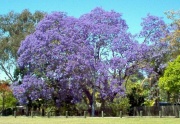Difference between revisions of "Jacaranda"
Jump to navigation
Jump to search
(username removed) |
|||
| (2 intermediate revisions by 2 users not shown) | |||
| Line 1: | Line 1: | ||
| − | [[File:Jacarandatreef5.jpg|thumb|Jacaranda tree | + | [[File:Jacarandatreef5.jpg|thumb|Jacaranda tree ''Jacaranda mimosifolia'']] |
| − | |||
| − | ''Jacaranda mimosifolia'']] | ||
== Description == | == Description == | ||
Wood from any of several catalpa trees of the genus ''Jacaranda'' native to the West Indies, tropical Americas, Florida, and California. One popular jacaranda wood is called caroba from the Brazilian tree, ''J. copia''. Jacaranda is a fragrant ornamental wood has been used for carvings, small decorative items, pianos, knife handles, cabinets, and expensive furniture. The name jacaranda has also been commonly used for other unrelated decorative type woods such as Brazilian rosewood and blue ebony. | Wood from any of several catalpa trees of the genus ''Jacaranda'' native to the West Indies, tropical Americas, Florida, and California. One popular jacaranda wood is called caroba from the Brazilian tree, ''J. copia''. Jacaranda is a fragrant ornamental wood has been used for carvings, small decorative items, pianos, knife handles, cabinets, and expensive furniture. The name jacaranda has also been commonly used for other unrelated decorative type woods such as Brazilian rosewood and blue ebony. | ||
| − | See also [ | + | See also [[catalpa]]. |
== Synonyms and Related Terms == | == Synonyms and Related Terms == | ||
| Line 12: | Line 10: | ||
''Jacaranda mimosifolia; Jacaranda cuspidifolia; Jacaranda copia''; jacaranda (Fr., Port.); catalpa; caroba; Brazilian rosewood; blue ebony | ''Jacaranda mimosifolia; Jacaranda cuspidifolia; Jacaranda copia''; jacaranda (Fr., Port.); catalpa; caroba; Brazilian rosewood; blue ebony | ||
| − | == | + | ==Physical and Chemical Properties== |
| − | Small tree = 8-13 m Bark = thin, smooth, gray-brown Flowers = Clusters of lavender blue cylinders (3 cm long) in late spring | + | * Small tree = 8-13 m |
| + | * Bark = thin, smooth, gray-brown | ||
| + | * Flowers = Clusters of lavender blue cylinders (3 cm long) in late spring | ||
| − | == | + | ==Resources and Citations== |
* Ralph Mayer, ''A Dictionary of Art Terms and Techniques'', Harper and Row Publishers, New York, 1969 (also 1945 printing) | * Ralph Mayer, ''A Dictionary of Art Terms and Techniques'', Harper and Row Publishers, New York, 1969 (also 1945 printing) | ||
| − | * ''Encyclopedia Britannica'', http://www.britannica.com Comment: "Jacaranda." | + | * ''Encyclopedia Britannica'', http://www.britannica.com Comment: "Jacaranda." Accessed 21 Aug. 2004. |
| − | * | + | * Virginia Tech Dendrology website at www.fw.vt.edu/dendro/dendrology/main.htm (accessed Oct. 3, 2005) |
| − | * Wikipedia | + | * Wikipedia: http://en.wikipedia.org/wiki/Jacaranda (Accessed Oct. 3, 2005) |
* ''Van Nostrand's Scientific Encyclopedia'', Douglas M. Considine (ed.), Van Nostrand Reinhold, New York, 1976 | * ''Van Nostrand's Scientific Encyclopedia'', Douglas M. Considine (ed.), Van Nostrand Reinhold, New York, 1976 | ||
Latest revision as of 12:04, 21 September 2022
Description
Wood from any of several catalpa trees of the genus Jacaranda native to the West Indies, tropical Americas, Florida, and California. One popular jacaranda wood is called caroba from the Brazilian tree, J. copia. Jacaranda is a fragrant ornamental wood has been used for carvings, small decorative items, pianos, knife handles, cabinets, and expensive furniture. The name jacaranda has also been commonly used for other unrelated decorative type woods such as Brazilian rosewood and blue ebony.
See also Catalpa.
Synonyms and Related Terms
Jacaranda mimosifolia; Jacaranda cuspidifolia; Jacaranda copia; jacaranda (Fr., Port.); catalpa; caroba; Brazilian rosewood; blue ebony
Physical and Chemical Properties
- Small tree = 8-13 m
- Bark = thin, smooth, gray-brown
- Flowers = Clusters of lavender blue cylinders (3 cm long) in late spring
Resources and Citations
- Ralph Mayer, A Dictionary of Art Terms and Techniques, Harper and Row Publishers, New York, 1969 (also 1945 printing)
- Encyclopedia Britannica, http://www.britannica.com Comment: "Jacaranda." Accessed 21 Aug. 2004.
- Virginia Tech Dendrology website at www.fw.vt.edu/dendro/dendrology/main.htm (accessed Oct. 3, 2005)
- Wikipedia: http://en.wikipedia.org/wiki/Jacaranda (Accessed Oct. 3, 2005)
- Van Nostrand's Scientific Encyclopedia, Douglas M. Considine (ed.), Van Nostrand Reinhold, New York, 1976
- Random House, Webster's Encyclopedic Unabridged Dictionary of the English Language, Grammercy Book, New York, 1997
- The American Heritage Dictionary or Encarta, via Microsoft Bookshelf 98, Microsoft Corp., 1998
